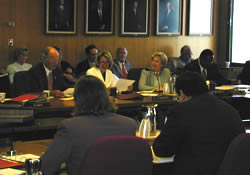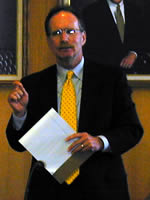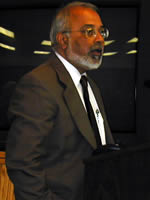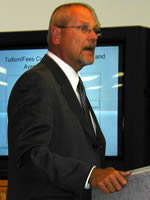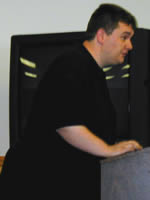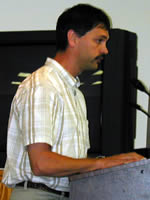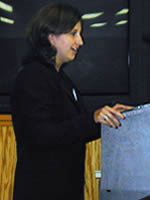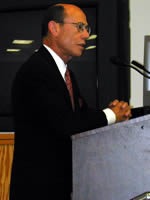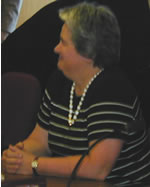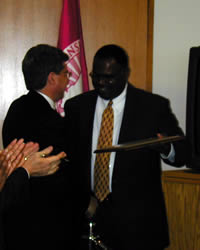UW System Board of Regents meeting
News Summary
MADISON — Signaling the dire need for restored quality and increased access to the University of Wisconsin System, the Board of Regents on Thursday (Aug. 19) unanimously approved its 2005-07 operating budget and capital budget requests to the state.
The operating budget request totals an annual average increase of $105.8 million over the biennium. The request includes an average 7.2 percent in state support each year.
“When it comes to success, the state and the university are increasingly joined at the hip,” said incoming UW System President Kevin Reilly. “In this budget, we request a modest reinvestment following the deepest cuts in the university’s history.”
The centerpiece of the 2005-07 operating budget request [pdf] is a new initiative to increase access to higher education for students from low-income families. The plan would provide financial aid grants to students from families with incomes less than $46,000 to cover any future tuition increases, dollar-for-dollar. The program would require an average annual increase of $4.9 million in state support.
The operating budget also calls for funds to restore quality lost due to recent budget cuts. The plan, requiring an average annual increase of $42.5 million in state support and fees, would allow the UW System to hire additional faculty to teach students and conduct research, and after six years, would result in an additional 1,000 graduates eligible to join Wisconsin’s workforce.
Among other initiatives, the operating budget also includes a request for funding to recruit and retain faculty and staff. The request would allow the university to offer competitive compensation to its faculty and staff, who ended the last fiscal year 5.49 percent behind their peers.
An average increase of $50.7 million annually would go toward meeting standard budget adjustments, including rising costs for utilities, fringe benefits and debt service, none of which directly supports student instruction. Another average increase of $3.6 million each year would go to support libraries and instructional technology.
In explaining the budget process, UW System President Katharine C. Lyall noted that Thursday’s vote was the first step in a long chain of events, and was not a “tuition-setting step.” Undergraduate tuition rates, which are determined by the state Legislature, will be made final after the 2005-07 state budget is set, likely in July 2005.
If the plan approved Thursday by the board is ultimately adopted by Gov. Jim Doyle and the state Legislature, undergraduate tuition would rise an average of 4.3 percent each year. Pay plans could add an additional 0.6 percent increase for each percent in salary increase approved by the Governor and Legislature.
The 2005-07 capital budget request [pdf] includes $227 million in state supported borrowing over 20 years to complete construction and renovation projects across the system’s 26 campuses. It also includes acceptance of $88.8 million in gifts and grants for capital projects, and includes $229.9 million in borrowing over 20 years that will be paid back with dollars generated by the university.
“Budgets are reflections of our core values; they are the most visible way that large, complex organizations like the UW System publicly signal their purposes, their goals, their accomplishments, and their needs,” Lyall said. “It is our aspirations for our students and our state that drive this budget request and our continuing commitment to our public purpose as a public university.”
The board approved the budgets after hearing testimony from students, faculty and staff, who told of the need to restore quality in the university’s teaching, research and public service; and to improve access for students from low-income families.
Padmanabhan Sudevan, professor of psychology at UW-Stevens Point, told the board that recruiting and retaining top faculty on campus is essential if the university is to effectively restore quality.
Sudevan testified about several faculty members who have chosen to leave the UW System to accept much more lucrative offers out of state.
“We need to concentrate on faculty to a greater extent than we have in the past few years,” he said. “Without faculty, students do not benefit from the education they receive.”
Jeff McKinnon, professor of biological sciences at UW-Whitewater, explained to the board the responsibilities of faculty members in today’s teaching and research environment, noting that expectations far exceed current compensation levels.
“When you don’t pay people what they are paying at other institutions, you don’t lose people at random. You lose your best people,” McKinnon said. “The amount of money is takes for this investment is small compared to the returns.”
Frank Emspak, an associate professor in the School for Workers at UW-Extension, also testified that UW staff are earning far less than what they deserve for the professional skills they bring to the university.
“Access is more than simply being allowed in to the university,” Emspak said. “Access also means access to a quality education.”
More students are applying for, and receiving, financial aid, but the average awards have not kept pace with tuition increases, putting low-income students at considerable disadvantage, said David Woodward, financial aid officer at UW-River Falls.
“At the very least, the neediest students need to be held harmless from future increases in tuition and fees,” Woodward said.
Mark Keller, a non-traditional transfer student from UW-Stevens Point, testified about the importance of a high student-faculty ratio in assisting students in receiving a high-quality education.
Keller remarked that at UWSP, assignments that require students to practice their writing and critical-thinking skills are “becoming a thing of the past,” as professors simply do not have the time to grade the written work of students who have increasingly larger class sizes.
“[I]t is important that we reverse this negative trend,” Keller said. “As a student, I believe that the teaching staff should be the primary focus of this new budget.”
Joe Weier, a non-traditional student from UW-Milwaukee, spoke of his personal experiences with reduced services and difficulty paying tuition as a result of the previous biennial budget cuts.
Weier noted that he has experienced a decrease in both the amount of academic advising and access to the educational resources he needs to complete his coursework.
“[T]he fall 2004 term is the first semester that I will need to secure significant financial assistance to offset the sharp increases in tuition,” Weier said. “My request is for the state of Wisconsin to reinvest state dollars in the UW System.”
Brad Stafford, Student Government President at UW-Stout, spoke about the need to invest in educational technology and supporting resources to give students a quality education.
Stafford told the board that the laptop program at UW-Stout allowed him to overcome a learning disability and achieve success in the classroom. He noted that students involved in courses that utilize laptop and other educational technologies have a 10 percent higher chance of success than those students who are enrolled in courses that do not utilize these resources.
“Funding technology is imperative for developing the graduates who will enter the 21st century workforce,” Stafford said.
Mike Quieto, co-President of the UW-Madison Teaching Assistants Association (TAA), pointed out that he often switched his class and office hours to the weekends to better accommodate lower- and middle-income students who worked almost full time during the week. He noted that to be successful, students need more contact with faculty, supplemented by help from teaching assistants and other academic staff.
He charged the board to view this budget request as a demand, saying, “Start making demands, stand up and fight, show we are committed to higher education.”
Bert Johnson, a student at the UW-Madison Law School, testified that the state budget process seems to pit different groups against one another, including students against faculty. Johnson said that politicizing this process was just a way to “pass the buck” to students who do not have a political identity at the Capitol.
“Raising tuition is not a solution,” Johnson said.
Stephanie Hilton, president of the United Council of UW Students, noted that the organization’s priorities for the 2005-07 budget request included full state funding for financial aid, minimal tuition increases, restoring faculty positions, competitive faculty salaries, maintaining services for students with disabilities, and the expansion of library and technology resources.
“Wisconsin’s economy cannot survive without an educated workforce,” Hilton said.
She also remarked that United Council and the New Voters Project are working to increase student voter turnout in the next election, in hopes of electing individuals who value and understand the importance of higher education funding for the future of Wisconsin.
Hilton thanked the regents and UW System staff for conducting an open biennial budget process, allowing diverse voices to be heard. Hilton finished her remarks by reciting a poem from Shel Silverstein, which made the point about the possible “Whatifs” that surround the budget process.
Overall, the state has suffered in recent decades because budget constraints have forced the UW System to hold back from many activities it could be doing to further improve the state’s economy, such as improving access for adult learners and increasing numbers of graduates, UW-Eau Claire Chancellor Donald Mash told the board.
“We have focused on other things, and that’s bad for Wisconsin’s future,” Mash said, adding that the UW System stands for potential and possibilities. “This is about Wisconsin, and all that can still come with reasonable investment.”
Following the testimony, regents discussed several options for moving the budget request forward, including modifying details about the budget initiatives and requesting that the funding be drawn from difference sources of support, but the resolution passed without amendment.
Several regents spoke in support of the request, saying that while the board was asking the state to provide significant levels of funding in an uncertain economy, the request is what is required for quality and access throughout the UW System.
“Good K-12 schools cost money, good roads cost money, and good higher education costs money,” said Regent Guy Gottschalk of Wisconsin Rapids. “I’m willing to pay more so that my grandson doesn’t grow up in Wississippi.”
Regent Roger Axtell of Janesville agreed, saying he was reassured knowing that UW System chancellors were also supportive of the request.
“I don’t think we should be afraid to … say ‘this is what we need,’ ” Axtell said.
Regent Jesus Salas of Milwaukee noted that he particularly favored approving the request for financial aid that provided for students from families in the two lowest-income levels, rather than just those from the lowest bracket.
Regent Peggy Rosenzweig said she understood that observers will have “sticker shock.”
“This is a big ask, but I am persuaded that this is the right course,” she said.
Regents initially voted 14-2 to pass the operating budget. In a show of solidarity, the board approved a motion by Regent Vice President David Walsh, who cast one of the no votes, that the vote be re-recorded as unanimous.
The budgets were largely developed with guidance from the Regents’ study of the university’s future, titled Charting A New Course for the UW System. The requests will be forwarded to the state Department of Administration next month.
Board honors departing leaders
Katharine C. Lyall accepted an extended standing ovation following a resolution from the board on Thursday, when she participated in her last full board meeting as UW System President. She will retire at the end of the month.
Board members each took a turn reading a portion of a resolution in appreciation of Lyall’s work as president, a position she held for 13 years.
Lyall imparted the board with several words of wisdom, underscoring the importance of the people who make the university the great institution it is, and noting the individuality of each campus and overall mission that makes the UW System so unique.
“Never lose faith in the ability of education to change lives,” Lyall said. “I thank you all from the bottom of my heart for giving me this opportunity.”
In September, Lyall, an economist, will begin a year’s appointment as a visiting senior scholar at the Carnegie Foundation for the Advancement of Teaching in Palo Alto, Calif.
Regent Gerard Randall of Milwaukee introduced a resolution that the board passed to honor Nino Amato, who recently completed his service on the board as president of the Wisconsin Technical College System.
In thanking the board for the recognition, Amato said there were few in Wisconsin who don’t respect the UW System and the state’s technical colleges for their potential. He warned, however that costs are spiraling out of control and may eventually rob the state of its valuable educational systems.
“In truth, the Wisconsin Idea is becoming an empty promise,” Amato said.
Amato also encouraged the board to work to reverse the trends of reduced funding for public higher education and when possible, to take strong actions, such as implementing a tuition freeze.
Also on Thursday, the board thanked former Chancellor Bill Messner for his leadership and service of the UW Colleges. Regent Elizabeth Burmaster noted that the UW Colleges grew by one-third during Messner’s tenure, and said that Messner was a man of “great wit, charm and integrity.”
Messner began his appointment as president at Mount Holyoke College in Massachusetts this week. The board on Thursday also unanimously passed a resolution to authorize a search for his replacement.
- Read the resolution for President Lyall
- Read the resolution for Regent Amato
- Read the resolution for Chancellor Messner
###
The Board of Regents will hold its next meeting September 9-10 in Van Hise Hall on the UW-Madison campus.
Supplemental Material
Testimony to the Board of Regents
Joe Weier, UW-Milwaukee student
Good morning, my name is Joe Weier, and I’m a student at UW-Milwaukee.
I was born and raised in Mineral Point, a small rural community in southwestern Wisconsin. I graduated in the top 5% of my class from Mineral Point High School in 1978. I began working with United Parcel Service in the fall of 1978. After 23 years of service with UPS, I was forced into early retirement November 2001, due to a back injury that was plaguing me since 1996.
With early retirement, UPS offered me the opportunity to further my education. Since high school, I had always had a desire to become an architect and a historic preservationist. Returning to college after being out of school for 23 years was the perfect opportunity to achieve my goal.
I began my education at UW-Platteville in the Fall of 2001 because it was near my home and family. However, my ultimate goal was to complete my degree at UW-Milwaukee in the School of Architecture, since it is the only accredited architecture program in the state. I used the UW-System Transfer Information System to verify which courses would transfer from Platteville to UWM. Advisors from both campuses worked with me to ensure that all of my credits from Platteville would apply to my degree at UWM. I was able to transfer 28 credits from UW-Platteville with a 4.0 GPA, and I don’t think that I could have achieved this without the writing center, tutoring services, or computer support that I received at Platteville.
I transferred to UW-Milwaukee in the fall of 2002. Everyday, I commute to campus from Glendale where I have an apartment and on the weekends I return home to Mineral Point to be with my wife and children. My wife, Lisa and I have three children. Kevin is 19 and a sophomore at UW-Platteville studying criminal justice (who has also joked that my transfer to UWM was a good move in more ways than one). Jacob is 16 and a junior at Mineral Point High School; soon we will be starting college visits with him. And Molly is 12 and a 7th grader who likes photography and interior design (but she has plenty of time to figure that out)! It has been challenging to be away from my family during the week, but because UWM is the only program in the state to offer architecture, it is important to me to complete my degree at UWM.
In my time at UWM, I have noticed the recent budget cuts and how they have affected my ability to obtain a quality education. For example, the fall 2004 term is the first semester that I will need to secure significant financial assistance to offset the sharp increases in tuition. Recently, I have seen faculty positions go unfilled or a teaching assistant completing the work of two. It has also been difficult for me to arrange an appointment with the undergraduate advisor because there is only one advisor in the office and she is already doing the work of two. I have noticed reduced hours in the Architecture Resource Center, which holds a variety of important reference books needed to complete my assignments. It has been challenging at times to complete my design projects when the architecture computer lab that has specific design software has had decreased hours. These concerns are consistent across campus—this is not unique to the School of Architecture and Urban Planning. My request is for the state of Wisconsin to reinvest state dollars in the UW System.
As I finish up my last two years at UWM with my upper division courses, I hope that I am able to stay on track. I’m afraid if these cuts continue that the required courses I need to complete my degree may not be offered when I need to take them. Despite recent cuts, I have been afforded many unique opportunities at UWM. For example, this summer, I volunteered with the Iowa County Land Records Department to collect data to diagram and identity cemetery plots at 86 different cemeteries. The completion of this internship was the final requirement to complete a certificate in Urban Planning, and I feel that this certificate will set me apart from the competition when I interview for an architecture position. Eventually, I would like to work out of my home designing and refurbishing existing structures by combining modern, more efficient elements with the older, more classic styles.
I thank you for the opportunity to share my experiences with you.
Testimony to Board of Regents
Mark Keller, UW-Stevens Point student
Good morning. My name is Mark Keller. I am a non-traditional transfer student at UW-Stevens Point. Before enrolling at UWSP, I worked for Compaq Computers in New Jersey. I was downsized after a merger with Hewlett Packard. Today I am going to share a few of my personal experiences with you. As a student, I have growing concerns about the quality of education at UW-Stevens Point under the current budget.
Student-Teacher Ratio
Student enrollment at UWSP has grown over the past few years. However, the faculty has not been adequately increased to accommodate this student growth. Increased class size has forced many teachers to eliminate, or dramatically reduce, critical thinking activities from their classes. As a result, the quality of education at Stevens Point has suffered.
Writing papers and essay questions on exams are no longer required in many classes. Writing assignments requiring critical thinking have been replaced with computerized multiple choice tests. Professors simply do not have the time to grade large amounts of written assignments. Many students have become passive learners, retaining only enough information to pass the test. In contrast, students who write are active learners. They are deeply involved in making important critical choices. Learning activities involving the writing process are becoming a thing of the past. Instructional time is being “stretched too thin.”
Teacher Retention
Teacher retention is also a problem at Stevens Point. I will give you a personal example of my own. This past spring semester one of my mentors announced to the class that he was in the process of applying for another teaching position outside of the UW System. The reason he gave for wanting to leave was that he received a pay increase of only 0% this year. In addition, he was unhappy that professors with his experience were earning more outside the UW System.
His announcement had a negative effect on student morale. Students relied on him not only as a great teacher, but also as a student advisor, and as the faculty advisor for the student television station. His departure would be a tragic loss for the communications department. This professor is just one of many talented teachers who are presently planning to leave the UW System. As a student, I consider many of them some of the brightest and the best.
Conclusion
In conclusion, it is important that we reverse this negative trend. As a student, I believe that teaching staff should be the primary focus of the new budget.
Testimony to Board of Regents
Stephanie Hilton, President of United Council
Good morning, my name is Stephanie Hilton and I am President of United Council of UW Students. Thank you for the invitation to speak today.
Back in February, students had the opportunity to present their priorities for the 2005-07 biennial budget. In May, those same priorities were presented to members of the Legislature at a joint hearing by the Assembly Colleges and Universities Committee and the Senate’s Higher Education and Tourism Committee. This biennial budget marks the first time students were invited to discuss their priorities with members of the Legislature before a budget proposal was on the table. In addition, students made it clear that they wanted an aggressive budget proposal when over 30 students and their families faxed in requests to the Board of Regents in July.
Wisconsin’s economy cannot survive without an educated workforce. In the last state budget, the UW System was cut $250 million, the largest in its history, coupled with as 37 percent tuition increase. These actions are destroying the chance to go to college for Wisconsin’s families.
Today, you all have the opportunity to set the course for debate on the 2005-07 biennial budget. This budget request should send a clear message communicating what the UW System needs from the state in order to remain a quality higher education system. Full state funding for financial aid, minimal tuition increases, restoring faculty positions, competitive faculty salaries, maintaining services for students with disabilities, and the expansion of library and technology resources are included in the biennial budget options before you today, and all components reflect student priorities.
I think we all can agree that the top priority is financial aid. In the last ten years, tuition has increased at the doctoral institutions by $2,839, and $2,084 at the Comprehensives and Colleges. All this while the maximum Wisconsin Higher Education Grant, the largest need-based aid program in the state, increased by a total of $510. However, $285 of that—over half—was funded by raiding the UW auxiliary accounts in the last biennial budget This funding choice suspended the link between financial aid and tuition increases, which students fought so hard for and won in the Budget Adjustment Bill under Governor McCallum.
Using one-time money to fund on-going programs is fiscally irresponsible. The state must fund financial aid at 100 percent. Between 1998 and 2002 there was a decrease of 1,508 new enrolled freshmen from the lowest three quintiles, while there was an increase of 856 new enrolled freshmen for the top two quintiles. The Wisconsin Higher Education Grant and Lawton Minority Undergraduate Retention Grant are not enough to solve this problem. Creating a Hold Harmless program for the two lowest quintiles would provide grants to cover tuition increases. This is a step towards regaining access, but should not be used as an excuse to raise tuition. In order to protect students from tuition increases, it is the state’s obligation to provide financial aid that increases at the same dollar amount as tuition. They cannot continue to gut UW System reserves to pay for financial aid.
Shalyn Miller, a former UW-Waukesha student, now at UW-Milwaukee, testified in front of the Legislature in May regarding the need for full state funding of financial aid. Shalyn paid $500 more to attend UW-Waukesha this past year, but only saw a $50 increase in financial aid.
“For me, financial aid means being able to stay in school or not, the difference between working full time and working part time and being able to have health insurance or not. I work around 30 hours a week, and I feel that increasing my work load by even 5 hours a week would be too much for me to handle. My parents do not have health insurance, and therefore, even though I am a full-time college student I am not covered under their health insurance. I am forced to provide my own insurance. I have been diabetic since I was 5 years old, and going without health insurance is not an option for me.”
Shalyn is not the only student in this situation, as there are about 20,000 UW students who receive the WHEG. The Governor and Legislature must realize that the state budget cannot be balanced on the backs of students. Students will be going to the polls and electing state representatives that believe the state must pay its share for the UW System. United Council has joined with the New Voters Project to increase voter turnout for 18-24 year olds. Together we will register over 85,000 students by October, and have already registered 55,000. Wisconsin needs to elect people who champion funding for college to protect Wisconsin’s future.
Tuition increases need to remain manageable for our families.
In 1994, tuition at the UW Comprehensives was just under $2,000, compared with $4,000 this academic year. In ten years tuition has doubled, with half of that increase happening in the current biennial budget. One of the biennial budget funding options calls for an 8.7 percent increase in tuition, which some may think is reasonable. However, such a rate translates into a $348 increase at the Comprehensives. That same percentage would have yielded a $167 increase back in 1994. Clearly, an eight percent tuition increase today is by no means comparable to a similar percentage ten years ago. In addition, a $348 increase in tuition is only $150 shy of the $500 annual increases that students are facing this year.
A 4.3 percent increase in tuition, paired with a 7.2 percent increase in state funding, is a fair and equitable proposal. The tuition increase is only acceptable if state funding increases at a higher percentage than tuition. According to the Department of Revenue, personal income growth is expected to be around four to five percent each year of the biennium. This places the tuition increase within that range, making it more likely that students and their families will be able to afford the increase.
Wisconsin ranks 30th for the percentage of its population that has a bachelor’s degree. However, our neighbor to the west, Minnesota, is ranked 11th. In order to compete with Minnesota, we need to increase the number of bachelor’s degree holders in the state of Wisconsin, and can only do that with a renewed investment from the state.
And we certainly can’t increase the number of degree holders without more faculty. Others that have testified before me have shared personal stories of the importance of quality faculty in the classrooms. Due to the 2003-05 budget cuts, the UW System has lost professors and on many campuses has not been able to fill vacancies due to retirements. The state has also lost professors to other universities because Wisconsin’s salaries are no longer competitive. UW System faculty play a major role in driving the state’s economy. Losing quality faculty is not just a student problem, but a detriment to the entire state. Faculty salaries must not be the sole financial burden of students.
Finally, UW System needs to be able to provide comprehensive services for students with disabilities. However, the Division of Vocational Rehabilitation used to fund these critical services, but after this academic year they will discontinue funding. The state needs to pick up the tab for these services so all students have an accessible, quality, education.
This biennial budget process has been more open and honest than it has been in the past. UW System staff has worked jointly with United Council to make sure student priorities were included in the biennial budget request. The opportunity for testimony speaks to the desire to ensure all voices are heard and that the Regents have enough information to make an informed vote.
However, the vote that you cast today will determine whether or not students will be working with the UW System and Board of Regents at the Capitol. If the Board passes a biennial budget request that calls for a higher tuition percentage increase than GPR, students will not be rallying with you beyond this proposal.
I urge you to pass the funding option that calls for a 4.3 percent increase in tuition, paired with a 7.2 percent increase in state funding, so that we can work together get the state to reaffirm its financial commitment to the UW System.
In addition, I want you to send something else to the Governor. Some Whatifs. Shel Silverstein wrote a poem about them, and I’ll share it with you.
[Read poem.]
Some Whatifs have crawled inside my ears. Whatif more students can’t afford to go to school? Whatif more professors leave the System? Whatif the state steals money again for financial aid? Whatif the state doesn’t invest anymore funds the UW System?
And the most nagging Whatif: Whatif the Governor and Legislature decide to increase tuition rather than admit that the State of Wisconsin can no longer afford a quality, higher education system?
Remarks to Board of Regents
Katharine C. Lyall, President
I’ve watched so many people deliver parting words of wisdom to this Board that it feels strange to be doing so myself. I will be brief, but I want to recognize and thank three groups of people who have been very important in my work here:
First, I want to thank my Cabinet and the System Administration staff, who understand their role as making our campuses effective and welcoming places for students to learn and faculty and staff to work. They understand our mission and work tirelessly to fulfill it.
Second, I am very grateful to the chancellors who lead each of our institutions, serve as civic leaders in communities throughout the state, and increasingly are called upon to be major fundraisers for their campuses. I have recruited and worked with more than fifty chancellors in my term as President and I thank them for their professionalism and their personal friendship.
Third, I am indebted to the Regents around this table, and those who have served earlier, for your stewardship of Wisconsin’s most important public asset. It is an awesome responsibility; I know you will support Kevin Reilly as you have supported me in these duties.
Finally, I’d leave you with three bits of advice, which you may adopt or ignore as seems useful.
- UW System is a federation of individual institutions, not branches of anything. Respect the local histories and the deep regional support for each campus, they are strengths.
- People count! UW System succeeds despite below-average funding because of exceptionally loyal employees who are committed to our mission—squander this, and there is no recovery. (Contemplate the price that is being paid by the U.S. economy and U.S. industry for squandering its human capital in the ’80s and ’90s.) We need to celebrate and reward public service if we are to sustain a first-rate public university in the future.
- Never lose faith in the ability of education to change lives—we are in the long term business of expanding knowledge and vision. The drafters of Chapter 36 gave us an inspiring mission; I urge you to read it now and again:
“(2) The mission of the system is to develop human resources, to discover and disseminate knowledge, to extend knowledge and its application beyond the boundaries of its campuses and to serve and stimulate society by developing in students heightened intellectual, cultural and humane sensitivities, scientific, professional and technological expertise and a sense of purpose. Inherent in this broad mission are methods of instruction, research, extended training and public service designed to educate people and improve the human condition. Basic to every purpose of the system is the search for truth.“
Thank you from the bottom of my heart for the privilege of leading this extraordinary public university system!
Resolution of appreciation
Katharine C. Lyall
WHEREAS, Katharine C. Lyall has served with unparalleled commitment as the fifth president, and the first female president, of the University of Wisconsin System since 1991; and
WHEREAS, she worked tirelessly to ensure that the UW System could provide quality teaching and learning experiences for the university’s more than 160,000 students; and
WHEREAS, Lyall helped revitalize the 13 freshman-sophomore UW Colleges, improving access and outreach services for Wisconsin citizens and nontraditional students in all corners of the state; and
WHEREAS, President Lyall strengthened the UW System’s relationship with the state’s technical colleges, paving the way for an improved state economy by increasing the number of baccalaureate degree holders in Wisconsin; and
WHEREAS, Katharine founded Wisconsin’s statewide PK-16 council, and with the leaders of the state’s technical colleges, private colleges and universities and K-12 schools, worked to develop seamless educational opportunities for all Wisconsin citizens; and
WHEREAS, she instituted the UW System’s first annual “accountability report,” an important way for the university to share information about its status and progress, including measures such as rates of access, graduation and retention; and
WHEREAS, President Lyall led the inception of the UW System’s Plan 2008, that has achieved a more diverse student, faculty, and staff population and helps ensure access and opportunity for all students, regardless of background; and
WHEREAS, she elevated the national stature of the UW System and its 26 campuses, that now attract nearly $800 million in grants and contracts each year and in the last 13 years, have received more than $7 billion in support from alumni and friends; and
WHEREAS, Lyall helped create WiSys, which affords all UW campuses the benefits and opportunities of transferring university research to the marketplace; and
WHEREAS, she distinguished her tenure by working with Regent leadership to co-chair four statewide Wisconsin Economic Summits, that led to regional economic initiatives, university solutions for improving Wisconsin’s economy, and laid the groundwork for Governor Doyle’s “Grow Wisconsin” program; and
WHEREAS, President Lyall championed the UW System as a vital economic engine, generating $9.5 billion and more than 29,000 graduates for the benefit of Wisconsin’s economy each year; and
WHEREAS, Katharine Lyall contributed her economic expertise for the betterment of the state as a member of numerous task forces and councils, including Governor Doyle’s Economic Growth Council, Governor Thompson’s Blue Ribbon Commission on 21st Century Jobs, Forward Wisconsin, and Competitive Wisconsin; and
WHEREAS, even as she performed the duties of president, Lyall continued her commitment to students, teaching economics to undergraduates as a professor of economics at UW-Madison; and
WHEREAS, President Lyall was instrumental in the leadership and direction of every UW campus, having hired more than 50 chancellors and worked with 52 members of the Board of Regents during her tenure; and
WHEREAS, the UW System has and will continue to benefit from Lyall’s remarkable service, one of the longest and most productive presidencies in the history of the UW System; and
WHEREAS, Katharine Lyall is the embodiment of the Wisconsin Idea— a dedicated, talented, honest, accomplished, and productive public servant who, for almost 13 years, selflessly gave her time and energy to lead this UW System into a new era;
BE IT THEREFORE RESOLVED that the University of Wisconsin System Board of Regents highly commends President Katharine C. Lyall for her accomplished tenure and distinguished service to the citizens of Wisconsin and to the institutions of the UW System; and
BE IT FURTHER RESOLVED that upon her retirement, the UW Board of Regents confers upon Katharine C. Lyall the title of President Emeritus; and wishes her every success in future endeavors.
Toby E. Marcovich
President of the UW Board of Regents
Madison, Wisconsin
This Nineteenth Day of August
Two Thousand and Four
Resolution of appreciation
Nino Amato
WHEREAS, Nino Amato has served the citizens of Wisconsin since 2003 as a member of the University of Wisconsin System Board of Regents; and
WHEREAS, as president of the Wisconsin Technical College System Board, Amato’s leadership helped further the work of a joint committee of the UW System and the state’s technical colleges to help the state increase the number of baccalaureate degree holders among its citizens; and
WHEREAS, Amato also worked with UW System and technical college officials in achieving progress toward more-seamless transfer opportunities between systems; and
WHEREAS, as a member of the Physical Planning and Funding committee, Amato helped the UW System be a prudent and efficient steward in maintaining and improving university lands and buildings; and
WHEREAS, Amato has served students, faculty, staff and Wisconsin residents through his service on the Committee on Student Discipline and Other Student Appeals and the Hospital Authority Board; and
WHEREAS, Regent Amato has worked in the spirit of the Wisconsin Idea by contributing his time and energy to serving students, faculty and staff within the communities of the University of Wisconsin and Wisconsin Technical College Systems;
BE IT THEREFORE RESOLVED, that the Board of Regents of the University of Wisconsin System thanks Regent Emeritus Nino Amato for his service and skilled stewardship of higher education in Wisconsin.
 Toby E. Marcovich
Toby E. Marcovich
President of the UW Board of Regents
Madison, Wisconsin
This Nineteenth Day of August
Two Thousand and Four
Resolution of Appreciation
William F. Messner
WHEREAS, William Messner has greatly advanced the mission and value of the University of Wisconsin System’s 13 freshman-sophomore campuses during his seven-year term as Chancellor of the UW Colleges; and
WHEREAS, he led the successful revitalization of the 13 UW Colleges campuses into a valuable statewide network that now serves more than 12,000 students ― an increase of 4,000 since the beginning of his tenure; and
WHEREAS, Messner ensured that UW Colleges’ campuses are providing high-quality liberal-arts instruction, preparing students for transfer and academic success in baccalaureate education at four-year UW campuses; and
WHEREAS, under Bill’s guidance, the UW Colleges expanded access to higher education for the state’s workforce by offering affordable, quality education, including online degree completion programs with four-year UW campuses, to >adult and place-bound students across Wisconsin; and
WHEREAS, Messner worked diligently with a Joint Legislative Committee and counterparts at the Wisconsin Technical College System to expand transfer opportunities, develop proposals to expand the number of baccalaureate degree holders in Wisconsin, and help the two systems achieve a more collaborative relationship; and
WHEREAS, he adopted and implemented a multi-year plan to improve faculty salaries at UW Colleges and to reward the core mission of excellence in teaching; and
WHEREAS, Bill has been a valued colleague and member of the UW System management team of chancellors, sharing with them the very challenging task of managing adroitly the largest budget cuts in the system’s history; and
WHEREAS, Messner has maintained the UW Colleges as an essential part of Wisconsin’s access to the UW System;
BE IT THEREFORE RESOLVED, that the University of Wisconsin System Board of Regents commends and extends deep gratitude to William F. Messner for his significant accomplishments and contributions, and wishes him well as he continues his career as president at Holyoke Community College.
Toby E. Marcovich
President of the UW Board of Regents
Madison, Wisconsin
This Nineteenth Day of August
Two Thousand and Four

